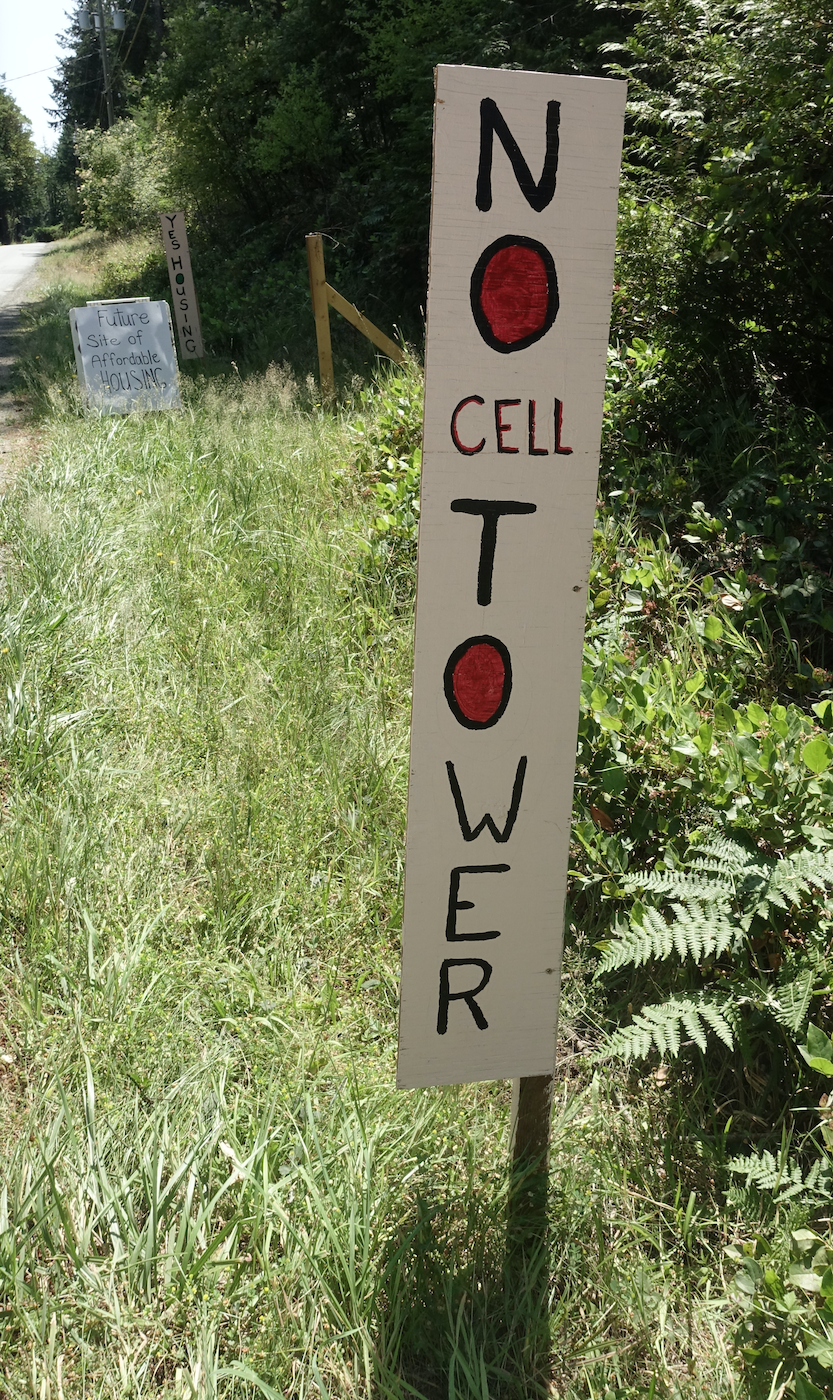ROGERS CELL TOWER APPLICATION DENIED

by William Thomas
A version of this story will appear in the Aug. 8 edition of The Islands Grapevine
A 20-month campaign by concerned residents to stop Rogers Communications from erecting a constantly radiating, 210 to 250-foot, seven-antenna cell tower in the centre of Hornby Island has ended with the Local Trust Committee delivering an emphatic thumbs down to the monster telco from Toronto.
The disturbingly delayed decision came after a legal opinion by barrister & solicitor, Carla Conkin — a Trust procedural expert retained by the Concerned Residents of Hornby Island (CRHI) — found that an Islands Trust planner had improperly blocked trustee Alex Allen’s original call for nonconcurrence in September 2023.
Allen was vindicated 10 months later, when he notified this reporter on July 11: We just passed this at an RWM : “That the Hornby Island Local Trust Committee does not concur with the proposed location for the Rogers Communication Inc. tower on Provincial Crown land on the west side of Central Road across from the fire hall, Hornby Island.”
(Opting instead for fibre-optic connectivity, Hornby is mostly covered by cell towers on Denman and adjacent islands, as well as Elon Musk’s Starlink orbiting overhead.)
Finally, it’s over.
Or is it?
Can this decision by Hornby’s LTC be overturned by federal regulators? Or the province, whose ruling is expected within weeks?
Technically yes.
In practice, no.
ISED (formerly Industry Canada) did not overrule the Hornby LTC’s vote against the Telus tower. To do so now would contravene the industry’s own guidelines, which defer to local government decisions, while risking a firestorm of adverse publicity.
On the provincial level, affordable housing remains a top priority. Which complicates the situation for Rogers, because, after two years of bureaucratic box-checking, the Hornby Island Economic Enhancement Committee has formally applied for permission to build critically needed community housing on this same elevated parcel of Crown Land.
It’s been a long and unfair fight. Rogers Communications first informed the Islands Trust corporation of its intentions on June 10, 2022, and formally applied for a Crown Lands permit two months later (Aug. 17). Yet, these calls to local battle stations were not disclosed by the Islands Trust until a notification appeared in the Comox Valley Record — five-weeks after it would have become a hot-button issue in Hornby’s mid-October LTC elections.
Before leaving the Trust for other employment, the planner explained to upset Hornby trustees that she “forgot” that Rogers was seeking a cell tower permit. This was curious, since FOIA documents reveal that she had emailed Brian Gregg concerning the Rogers tower on Sept. 9, 2022 — the same day she described the Trust’s Model Antenna Siting Strategy at a public LTC meeting on Hornby — without mentioning the Rogers application.
Failure to notify the Hornby community and LTC of the Rogers cell tower application for three months, while contacting other off-island agencies listed in the FOIA, was yet another grievous flaw in a disturbingly drawn-out process that saw Rogers and Island Trust planners sidestep local opposition by ignoring community, regional and federal requirements, Hornby’s antenna siting bylaws, and the Trust’s own Model Antenna Strategy to fast-track an injurious industrial eyesore onto an island that overwhelmingly defeated a similar Telus proposal seven years before.
As the “Preserve and Protect” smokescreen begins to clear, what lessons can be learned from this latest Islands Trust debacle?
“We got to this place because our LTC refused to uphold our community plan,” charges longtime Hornby resident, Helen Grond. “The application should never have been considered in the first place because it directly contravenes our OCP.”
Is she right?
Although Rogers “insultant” Brain Gregg publicly boasted that his client’s tower would also serve “boaters” and nearby islands, Section 5.5.4 of Hornby’s Official Community Plan stipulates: “All public service and utility installations on the Island should be for servicing Hornby Island only.”
Trust corporate planners “always deferred to Rogers, never to the community,” Grond continues. “They put us thorough hell. We spent thousands of dollars to fight this. The ordeal we were put through trying to protect our island [from Rogers and the Trust] is completely unacceptable on all levels.”
Grond wants to “remind” Trust officials that not only are cell towers inappropriate for Hornby Island, “it’s enough that cell towers are disallowed in our community plan. We know exactly what happened. They threw an election. They lied.”
Trust-Rogers correspondence released under a Freedom of Information request substantiate these claims and more.
“This is one small piece of much bigger fight,” Helen Grond concludes. Speaking for many, she warns Trust officials: “Don’t think for an instant that you can come at this again.”

Rogers' posted notice surroounded by affordable housing signs at entrance to contested site -Will Thomas photo